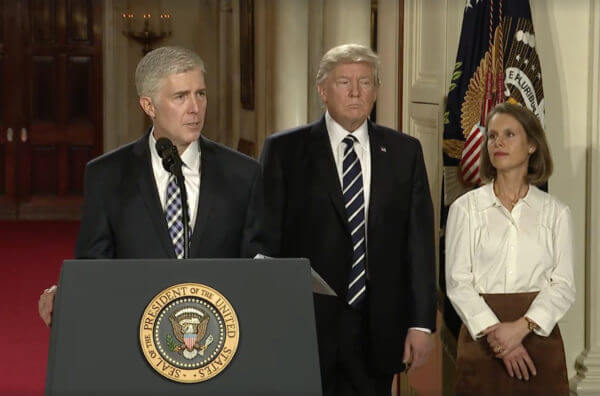Republican Governor Phil Bryant pledged an immediate appeal of Judge Carlton W. Reeve’s injunction against implementing H.B. 1523. | LANCE CHEUNG/ USDA
BY ARTHUR S. LEONARD | Just minutes before Mississippi’s anti-LGBT H.B. 1523 was scheduled to go into effect on July 1, US District Judge Carlton W. Reeves filed a 60-page opinion explaining why he was granting a preliminary injunction to the plaintiffs in two cases challenging the measure.
According to Reeves, H.B. 1523 violates both the First Amendment’s Establishment of Religion Clause and the 14th Amendment’s Equal Protection Clause.
His lengthy, scholarly opinion expands on points he made just days earlier when he granted a preliminary injunction in a separate lawsuit, blocking implementation of one provision of the law that allowed local officials responsible for issuing marriage licenses to “recuse” themselves from issuing licenses to same-sex couples based on their “sincere” religious beliefs.
Unlike the earlier ruling, however, Reeves’ June 30 opinion treats H.B. 1523 as broadly unconstitutional on its face.
Judge finds state improperly established “special” religious rights, ignored its equal protection obligations
Although Mississippi Governor Phil Bryant, the lead defendant in all three lawsuits, announced that the state would immediately appeal to the US Fifth Circuit Court of Appeals, Reeves’ opinion seemed likely to withstand judicial review. Attorney General Jim Hood, Mississippi’s only Democratic statewide elected official and also a named defendant, suggested he might not be joining in such an appeal, voicing agreement with Reeves’ decision and suggesting that the legislature had “duped” the public by passing an unnecessary bill.
Hood pointed out that the First Amendment already protected clergy from any adverse consequences of refusing to perform same-sex marriages and that the state’s previously-enacted Religious Freedom Restoration Act already provides substantial protection for the free exercise rights of Mississippians.
Reeves found that, at its heart, H.B. 1523 spells out three “sincerely held religious beliefs or moral convictions” that the legislature had inappropriately given “special legal protection.” The beliefs in question are “(a) Marriage is or should be recognized as the union of one man and one woman; (b) Sexual relations are properly reserved to such a marriage; and (c) Male (man) or female (woman) refer to an individual’s immutable biological sex as objectively determined by anatomy and genetics at birth.”
State Attorney General Jim Hood, a Democrat, signaled he is unlikely to join the state’s appeal, endorsing the judge’s reasoning and saying the legislature had “duped” the public. | AGO.STATE.MS.US
Under the law, then, any person or entity holding such beliefs is free from any government penalty for acting on them by, for example, denying restroom access to a transgender person or refusing to provide goods or services to a same-sex couple for their wedding.
The plaintiffs in these cases argue that by privileging people whose religious beliefs contradict the federal constitutional and statutory rights of LGBT people, the State of Mississippi has violated its obligation under the First Amendment to preserve strict neutrality concerning religion as well as its duty under the 14th Amendment to afford “equal protection of the law” to LGBT people.
Reeves, who ruled in 2014 that Mississippi’s ban on same-sex marriage was unconstitutional, agreed with the plaintiffs in all their arguments. In granting a preliminary injunction, he did not have to reach an ultimate decision on the merits of their plaintiffs’ claims — he merely needed to show they were “likely” to prevail. His strongly-worded opinion, however, leaves no doubt about his view of the merits.
“The Establishment Clause is violated because persons who hold contrary religious beliefs are unprotected — the State has put its thumb on the scale to favor some religious beliefs over others,” Reeves wrote in his introduction. Then quoting from a 2000 Supreme Court ruling, he continued, “Showing such favor tells ‘nonadherents that they are outsiders, not full members of the political community, and adherents that they are insiders, favored members of the political community.’ And the Equal Protection Clause is violated by H.B. 1523’s authorization of arbitrary discrimination against lesbian, gay, transgender, and unmarried persons.”
Much of Reeves’ opinion was devoted to rejecting the state’s arguments that the plaintiffs did not have standing to bring the lawsuits, that the defendants lacked liability to be sued, and that injunctive relief was unnecessary because nobody had been injured by the law. Reeves cut through these arguments with ease, citing the 1996 US Supreme Court precedent in Romer v. Evans, involving a ballot initiative preventing the State of Colorado from providing any protections against anti-gay discrimination. After state courts found that LGBT advocates could challenge that measure, it never went into effect because the Supreme Court found it violated the 14th Amendment’s Equal Protection Clause.
Quoting from the Romer decision, Reeves wrote, “It is not within our constitutional tradition to enact laws of this sort.”
In both his earlier ruling on the law’s clerk “recusal” provision and in his June 30 decision, Reeves alluded to Mississippi’s resistance to the Supreme Court’s racial integration rulings from the 1950s and 1960s and focused on how H.B. 1523 was specifically intended by the legislature as a response to the Supreme Court’s ruling last year in Obergefell v. Hodges, holding that same-sex couples have a constitutional right to marry. In considering H.B. 1523, Mississippi legislators made clear that its intention was to allow government officials and private businesses to discriminate against LGBT people without suffering any adverse consequences, just as the state had earlier sought to empower white citizens of Mississippi to preserve their segregated way of life.
Reeves quoted comments by Governor Bryant criticizing Obergefell as having “usurped” the state’s “right to self-governance” and mandating the state to comply with “federal marriage standards — standards that are out of step with the wishes of many in the United States and that are certainly out of step with the majority of Mississippians.” In a footnote, Reeves observed, “The Governor’s remarks sounded familiar. In the mid-1950s, Governor J.P. Coleman said that Brown v. Board of Education ‘represents an unwarranted invasion of the rights and powers of the states.’” The judge also wrote, “In 1962, before a joint session of the Mississippi Legislature — and to a ‘hero’s reception’ — Governor Ross Barnett was lauded for invoking states’ rights during the battle to integrate the University of Mississippi.”
Reeves specifically noted how the earlier period’s racial segregationists had invoked religious beliefs as a basis for failing to comply with the Supreme Court’s decisions.
Challenging the state’s contention that the law aimed to “address the denigration and disfavor religious persons felt in the wake of Obergefell,” Reeves pointed out what was really going on.
“The title, text, and history of H.B. 1523 indicate that the bill was the State’s attempt to put LGBT citizens back in their place after Obergefell,” he wrote. “The majority of Mississippians were granted special rights to not serve LGBT citizens, and were immunized from the consequences of their actions. LGBT Mississippians, in turn, were [quoting Romer v. Evans] ‘put in a solitary class with respect to transactions and relations in both the private and governmental spheres’ to symbolize their second-class status. As in Romer, Windsor [the 2013 case that struck down the Defense of Marriage Act], and Obergefell, this ‘status-based enactment’ deprived LGBT citizens of equal treatment and equal dignity under the law.”
Given that Mississippi has no state law forbidding discrimination based on sexual orientation or gender identity, the state tried to claim H.B. 1523 did not have the effect of imposing any new harm, but Reeves pointed to municipal protections in the city of Jackson and policy protections at the University of Southern Mississippi, on which the new state law “would have a chilling effect.”
Reeves concluded, “Religious freedom was one of the building blocks of this great nation, and after the nation was torn apart, the guarantee of equal protection under law was used to stitch it back together. But H.B. 1523 does not honor that tradition of religious freedom, nor does it respect the equal dignity of all of Mississippi’s citizens. It must be enjoined.”






































